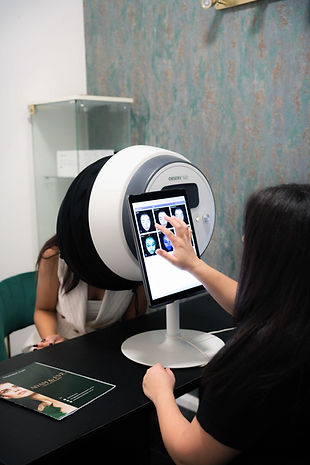
Rosacea
Rosacea can cause redness, irritation, and sensitivity, but our gentle treatments are designed to calm and balance your skin. We focus on reducing inflammation and promoting a more even, healthy complexion. With our specialised care, your skin feels soothed, and you can confidently manage rosacea.
ABOUT ROSACEA
ABOUT
Rosacea is a chronic skin condition that primarily affects the face, causing redness, visible blood vessels, and sometimes acne-like bumps. While the exact cause of rosacea is unknown, it is thought to be linked to a combination of genetic and environmental factors. The condition often begins with a tendency to blush or flush more easily than others and can gradually progress to more persistent redness and other symptoms. Rosacea can be a source of discomfort and self-consciousness, but with the right treatment, its symptoms can be effectively managed.
SYPMTOMS
Rosacea symptoms can vary widely among individuals, but common signs include: Facial Redness: Persistent redness, particularly in the central part of the face (cheeks, nose, chin, and forehead), is a hallmark of rosacea. This redness may resemble a sunburn or blush that doesn’t go away. Visible Blood Vessels: Small, dilated blood vessels (telangiectasia) often appear on the surface of the skin, especially on the cheeks and nose. Bumps and Pimples: Many people with rosacea develop small, red, pus-filled bumps or pustules that can resemble acne, but they lack blackheads. Eye Irritation: In some cases, rosacea can affect the eyes, causing dryness, irritation, swollen eyelids, and a condition known as ocular rosacea. Thickened Skin: Over time, the skin, particularly on the nose (a condition known as rhinophyma), may thicken and become bumpy due to excess tissue growth. Rosacea symptoms can flare up and then disappear for a while, only to return later, often triggered by certain factors.
Causes
The exact cause of rosacea remains unclear, but several factors are believed to contribute to its development: Genetics: A family history of rosacea increases the likelihood of developing the condition, suggesting a genetic predisposition. Immune System: Some research suggests that an overactive immune response may play a role in rosacea, causing inflammation and the characteristic redness. Environmental Factors: Exposure to certain environmental elements like sunlight, wind, extreme temperatures, and even spicy foods can trigger or worsen rosacea symptoms. Microorganisms: The presence of a type of mite (Demodex folliculorum) that lives on the skin or a bacterium (Helicobacter pylori) found in the gut has been linked to rosacea, although their exact role is not fully understood. Blood Vessel Abnormalities: Some experts believe that rosacea is related to abnormalities in facial blood vessels, leading to the redness and visible blood vessels associated with the condition. Triggers: Common triggers include hot drinks, alcohol, spicy foods, emotional stress, and certain skincare products, all of which can cause flare-ups in susceptible individuals. Understanding these causes and identifying personal triggers can help in managing rosacea and minimising its impact on daily life.

OUR RECOMMENDED TREATMENTS
SHOP SKINCARE FOR ROSACEA

Prior to any skin treatment, it's essential to understand your skin's unique needs and challenges. Our comprehensive skin consultation featuring the Observ 520 skin analysis, a vital step in achieving your skincare goals.
With the Observ 520 skin analysis, we provide an in-depth assessment of your skin's condition, analysing various factors such as pigmentation, hydration levels, and sun damage. This advanced technology allows us to identify underlying issues that may affect treatment outcomes and tailor a personalised skincare plan to address your specific concerns. By gaining insights into your skin's health and characteristics, we can ensure that every treatment is precisely tailored to deliver optimal results.










































